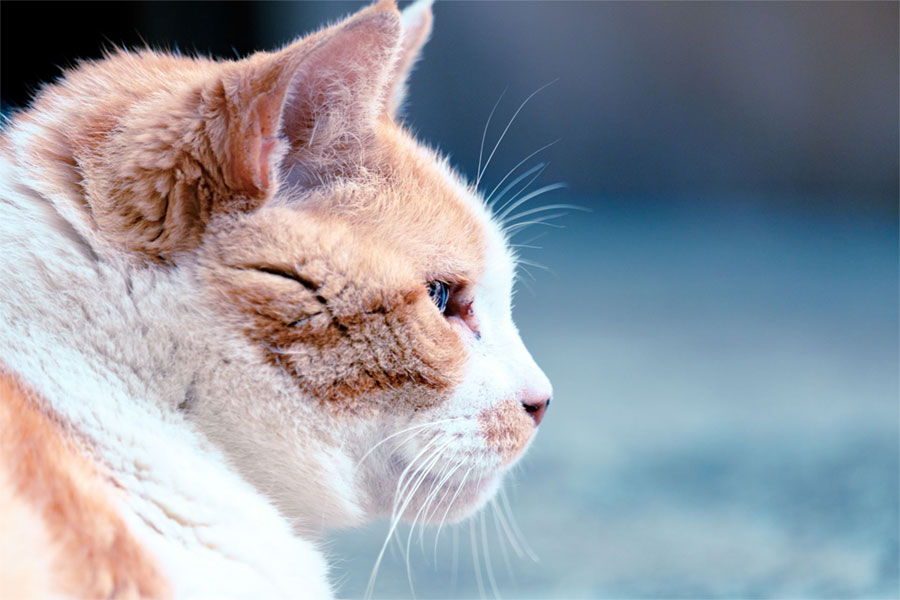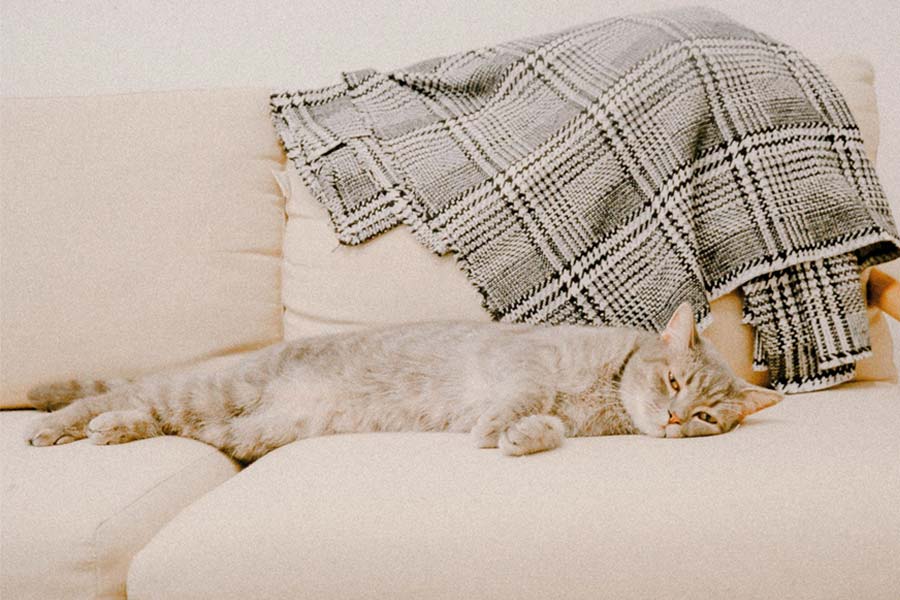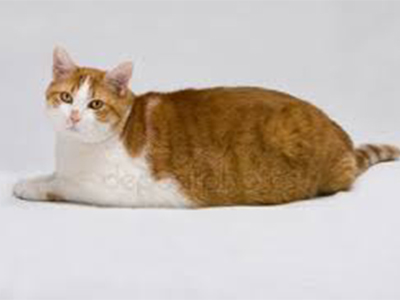Health Problems in Senior Cats
There are several common health problems we see in older-age cats. An older cat’s health should be closely monitored when it becomes a senior. We consider a cat “senior” when it is 9 years of age and older, which is two-thirds of their average life expectancy. Senior cat health problems can include a number of ailments, but these are the ones we see most commonly.

Most Common Elderly Cat Health Problems
Cat health problems are not just caused by old age. Common health problems in older cats are often related to their lifestyle habits and their unique physiology. Being active hunters and meat eaters puts strains on their bodies that other species may not experience. Over time, these species-specific characteristics can lead to a few common health problems in older cats. Here are the ones we see frequently:
Kidney Disease
Kidney disease is probably the most common health problem of older cats. Cats have specific dietary requirements because they are carnivores (meat eaters). Their kidneys are very efficient at removing the waste produced from metabolizing protein. As cats age, their kidneys sometimes become less efficient and they develop kidney disease. In most of these cases we see chronic kidney disease (CKD), which means it happens over a period of time. CKD can be caused by infections, genetics, and age related changes. The most common signs of older cats with kidney disease are drinking and urinating more, weight loss and vomiting. Check out our article onRenal Failure in Catsfor more information.
Arthritis
Cats are very agile. In their regular everyday activities they are often climbing and jumping. These activities can be very taxing on their joints, and as our cats age they often develop osteoarthritis. Cats are very good at masking joint pain, but there are subtle signs to look for. Arthritic cats may spend more time than usual sleeping and less time playing or hunting. Arthritis can present as stiffness and lameness, or your cat may not like to be petted or picked up if they are experiencing pain.

Thyroid Disease
Older cats are at higher risk of developing thyroid problems. The thyroid gland is responsible for producing and releasing thyroid hormone. Thyroid hormone controls metabolism. Cats will most commonly develop hyperthyroidism, which means their thyroid gland is producing too much thyroid hormone. When thyroid hormone levels are high, your cat’s metabolism is put into overdrive. Increased metabolism also influences the heart and these cats can develop severe heart disease, which can lead to heart failure. Signs of hyperthyroidism include: increased appetite with weight loss, hyperactivity, and increased thirst with increased urination.
Obesity and Diabetes
Obesity is a common finding in older cats. As your cat ages his activity levels may decrease while feeding protocols stay the same. Indoor cats are especially at risk of developing weight problems due to their sedentary lifestyle. When cats are overweight they are at a higher risk of developing diabetes. Signs of diabetes include drinking more, urinating more, weight loss, loss of appetite, vomiting and dehydration.

Cancer
Just like in humans, the risk of developing cancer generally goes up with age. Chronic inflammatory processes can lead to cancer, so as our pets age their risk increases. There are many types of cancer, but some of the most common in cats include lymphoma, fibrosarcoma and squamous cell carcinoma. The signs of cancer are specific to the type of cancer, but generally can include vomiting, diarrhea, weight loss, loss of appetite or the development of a mass.
Dental Disease
Dental disease is a slowly progressing disease, but since our pets do not brush their teeth on a daily basis they can develop severe dental disease over their lifetime. Studies have shown that 50 to 90% of cats over the age of 4 have dental disease. Cats can experience gingivitis, cavities, reabsorption of teeth and bone infections from tooth decay. Signs of dental disease include bad breath, salivation, raw/bleeding gums and in some cases, reluctance to eat.
Metabolic or Endocrine Disorders
These are disorders that occur when there are imbalances in the body’s metabolic and endocrine functions. Examples of these include diabetes and hypothyroidism. Symptoms of these health problems in older dogs, like any dog, are very specific to the disease itself but diagnosis usually occurs with blood work. Routine senior blood panels will check for the most common metabolic and endocrine disorders. Treatment is often available if the condition is identified early.
Treatment of Health Problems in Elderly Cats
Cats can be very good at masking their health problems, so if you think that your senior cat may be sick please also take a look at our blog“Top 5 Signs of Sickness in Cats.”If your elderly cat has health problems, please contact your veterinarian right away. Many of these conditions are treatable, and with early detection and diagnosis your older cat can have many more years of good quality life ahead of them. If you have any questions about any of the information found here, pleasecontact usand we would be happy to assist you.
References
- vet.cornell.edu – Feline Diabetes
- pets.webmd.com – Cancer in Cats: Types, Symptoms, Prevention, and Treatment
- https://www.vet.cornell.edu/departments-centers-and-institutes/cornell-feline-health-center/health-i…
- https://www.vet.cornell.edu/departments-centers-and-institutes/cornell-feline-health-center/health-i…
- Photos courtesy of: Unsplash and Depositphotos